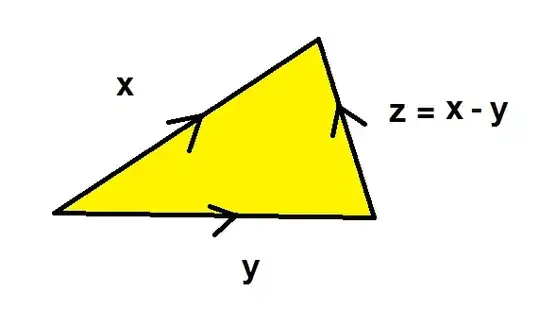I want to prove that, $$\left| x-y\right|\geq\left| x\right| -\left| y\right|$$ I approached the problem like this af:
Since $-\left|z\right|\leq z\leq\left|z\right|$ is true for any real number $z$, we can write the same for reals $x$ and $y$: $$-\left|x\right|\leq x\leq\left|x\right|$$ $$-\left|y\right|\leq y\leq\left|y\right|$$ We can subtract one expression from the other and get: $$-(\left|x\right|-\left|y\right|)\leq x-y\leq\left|x\right|-\left|y\right|$$
And, since $-a\leq z\leq a$ is equivalent to $\left|z\right|\leq a$ (for any real number $z$), we can write the following: $$\left| x-y\right|\leq\left|x\right|-\left|y\right|$$
This is, in fact, the opposite of what I intended to prove. I know the correct derivation though. Since $-\left|z\right|\leq z\leq\left|z\right|$ is true for any real number $z$, we can write the same for $y$ and $x-y$: $$-\left|y\right|\leq y\leq\left|y\right|$$ $$-\left|x-y\right|\leq x-y\leq\left|x-y\right|$$ By adding the two inequalities, we get: $$-(\left|x-y\right|+\left|y\right|)\leq x\leq\left|x-y\right|+\left|y\right|$$ And, since $-a\leq z\leq a$ is equivalent to $\left|z\right|\leq a$ (for any real number $z$), we can write the following: $$\left| x\right|\leq\left|x-y\right|+\left|y\right|$$ Finally, we can subtract $\left|y\right|$ from both sides and voila: $$\left| x\right|-\left| y\right|\leq\left|x-y\right|$$
This equation is simply failsafe, it holds true for all real values of $x$ and $y$. I'm more curious about $\left| x-y\right|\leq\left|x\right|-\left|y\right|$. It seems algebraically correct but ho, it's experimentally BS. Try placing $x=-6$ and $y=-7$ for instance. The values for $\left| x-y\right|$ and $\left|x\right|-\left|y\right|$ are respectively $1$ and $-1$.
Total BS, no?
So where did I screw up? I must have screwed up algebraically, but where? What's so wrong about $\left| x-y\right|\leq\left|x\right|-\left|y\right|$, algebraically?
